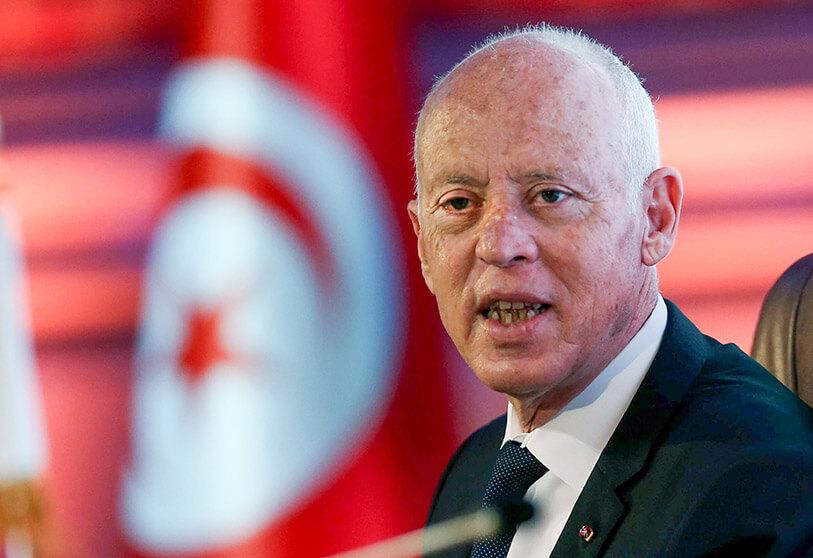Tunisia expels top European trade union official: It is true that many African countries have struggled with democracy and democratic backsliding is also a painful reality for many countries across the continent. One such example is Tunisia. From the Jasmine revolution to the current political and economic state of the country, we can’t really say that Tunisia has come a long way. What is more unfortunate is that the West has always taken advantage of the weak political systems of poor African countries. In the name of assistance and support, often they end up making the situation even worse.
So, is foreign interference desirable? NO, and Tunisia has made it loud and clear.
Tunisia expels top European trade union official
President Kais Saied of Tunisia has ordered Europe’s top trade union official to leave the North African country and Tunisia expels top European trade union official with immediate effect.
The order has come after she was found to have addressed protesters at a demonstration organized by an influential labour union in the country.
Esther Lynch, the Irish general secretary of the European Trade Union Confederation, has been accused by Tunisian authorities of making statements that “interfered with Tunisian internal affairs” during a protest against Saied in the port city of Sfax.
A statement by the Tunisian presidency that was also posted on Twitter stated, “By orders of the president, Tunisian authorities ordered Esther Lynch to leave the country within 24 hours, following statements made during the UGTT-led demonstration that interfered with Tunisian internal affairs,”
As per the report, The European Trade Union Confederation has confirmed that Lynch had left Tunisia on Sunday.
What happened?
Tunisia’s General Labour Union or UGTT, had organised a demonstration to protest against a crackdown on the Tunisian president’s political opponents and his critics in the media, judiciary, business community and trade unions. So far so good.
But this was also joined by the European Trade Union Official Esther Lynch, who in an address to the protesters, demanded the release of union leader Anis Kaabi, who was arrested by security forces in January.
She also called on the Tunisian government to negotiate with the UGTT leadership and to improve the economy.
Tunisia’s politics
When the Jasmine Revolution started, it quickly turned into a popular movement known as the “Arab Spring” that demanded the uprooting of the dictatorial regimes. The revolution gained popularity as it was against corruption, poverty, and political repression.
However, soon after the revolution, political differences emerged and the country gradually descended into instability again. The crisis gradually intensified in Tunisia due to violent demonstrations over economic grievances, inequality, unemployment and political killings.
Read More: Tunisia – From Jasmine revolution to constitutional emergency
However, post-2015, along with the political crisis, the economic crisis aggravated too.
In recent months, Tunisians have been hit by soaring food prices, shortage of fuel and basic staples like sugar and vegetable oil.
In December, the International Monetary Fund froze an agreement on a $1.9 billion loan for Tunisia. The deeply indebted government needs the funds to pay UGTT-represented public sector salaries and to fill budget gaps aggravated by the COVID-19 pandemic and the Ukraine Russia Crisis.
Earlier, thousands had protested against the seizure of power by the President thereby demanding for him to step down.
This indicates that the country’s social, economic and constitutional crises have definitely deepened.
However, foreign interference is the last thing that an African country needs to deal with its internal affairs.
Pushback against foreign interference
It has been observed in the past that Western interference in Africa often comes with malicious intentions and ends up aggravating crisis situations.
It is also due to such tactics, that West’s credibility has reached an all-time low in the African continent.
Recently, Uganda decided to throw out UN’s Human Rights Body and made it clear that it will rely on domestic institutions to safeguard rights. The country had done well as it is not untrue that often human rights violations cases are fabricated in developing countries. This is done to establish “legal” grounds for humanitarian intervention by neo-imperial Western powers which then carry on their work to achieve their own geo-strategic interests.
Read More: Uganda decides to throw out UN’s Human Rights body for good
Similar actions were also taken by insurgency-hit Burkina Faso when it declared United Nations´ resident and humanitarian coordinator, Barbara Manzi, persona non grata. Just after two weeks, it also expelled France’s ambassador amid a growing anti-France sentiment due to its inability to curb insurgency and suspicion over its neo-colonial designs.
Thus, it seems that the growing anti-West sentiment has also reached Tunisia or it has understood the tactics employed by the Western forces to destabilize countries. Specially at a time, when the country is already going through a lot of social, political and economic crisis, there is every possibility that attempts to destabilise it further by inciting chaos will be made, only to be exploited later by neo-colonial evil designs. Thus, Tunisia has only nipped it in the bud.
https://www.youtube.com/watch?v=6fGGPsqdRtg
